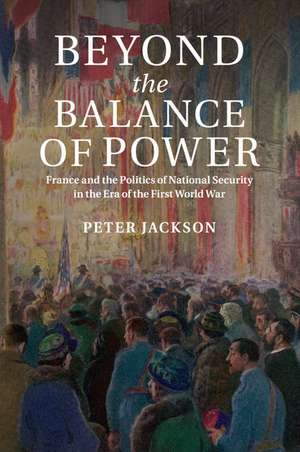Beyond the Balance of Power: France and the Politics of National Security in the Era of the First World War
Autor Peter Jacksonen Limba Engleză Paperback – 14 dec 2016
Preț: 432.86 lei
Nou
Puncte Express: 649
Preț estimativ în valută:
82.84€ • 86.37$ • 68.85£
82.84€ • 86.37$ • 68.85£
Carte tipărită la comandă
Livrare economică 21 martie-04 aprilie
Preluare comenzi: 021 569.72.76
Specificații
ISBN-13: 9781316635308
ISBN-10: 1316635309
Pagini: 582
Ilustrații: 4 maps
Dimensiuni: 152 x 230 x 31 mm
Greutate: 0.77 kg
Editura: Cambridge University Press
Colecția Cambridge University Press
Locul publicării:Cambridge, United Kingdom
ISBN-10: 1316635309
Pagini: 582
Ilustrații: 4 maps
Dimensiuni: 152 x 230 x 31 mm
Greutate: 0.77 kg
Editura: Cambridge University Press
Colecția Cambridge University Press
Locul publicării:Cambridge, United Kingdom
Cuprins
Introduction; Part I. The Sources of French Security Policy: 1. The social dynamics of security policy making; 2. Two approaches to security; Part II. War and the Politics of National Security, 1914–18: 3. The primacy of the balance of power, 1914–16; 4. The coming of a new world order, 1917; 5. National deliverance and post-war planning; Part III. Peace and Security, 1918–19: 6. The political contexts of peacemaking; 7. Towards a post-war security order; 8. The Rhineland settlement and the security of France; Part IV. Imposing Security: 9. Post-war dilemmas: enforcement or engagement?; 10. Briand and the emergence of a multilateral alternative; 11. The politics of confrontation; Part V. The Cartel des Gauches and the 'Internationalisation of Security': 12. A new approach: arbitration, security, disarmament; 13. Locarno; Conclusion.
Recenzii
'By emphasizing the political, social, and cultural contexts of foreign policy decision-making and the clash between balance of power and internationalist security doctrines, Peter Jackson offers a provocative new interpretation of French security policy and international politics in the era of the First World War. In the process he engages some central debates in international relations theory. Beyond the Balance of Power is a major contribution with an interdisciplinary appeal, and essential reading for students of both the history and theory of security policy.' Jack S. Levy, Board of Governors' Professor, Rutgers University, New Jersey
'Why is France repeatedly cast as the villain when it comes to the ultimate failure of international initiatives and transnational efforts to re-order world affairs after the First World War? Answering this fundamental question animates Peter Jackson's panoramic study of French security policy before, during and after the Great War. Rare are the historians capable of integrating international relations theory and sociologies of power into their assessments of the past. Jackson not only does so, he makes the conceptual thinking of politicians, diplomats, soldiers and civil society activists his critical explanatory tool in digging for answers to France's security dilemmas of the early twentieth century. Untangling the political, cultural and, above all, the juridical roots of French ideas about peace, war, and international obligation, the result is breathtaking: a transformative work in an otherwise crowded historical field. The book is sure to become a classic.' Martin Thomas, Professor of History, Exeter University
'Peter Jackson has written a highly original and dramatically different account of French diplomacy in the critical war and post-war years. It is not only based on extensive work in the archives but moves beyond both national and theoretical boundaries to provide challenging portraits of the makers of policy as well as the consequences of their assumptions about the role of France in a multipolar international system.' Zara Steiner, University of Cambridge
'… quite simply, an absolutely brilliant book. Peter Jackson has produced a fascinating interpretation of French foreign and security policy in the tumultuous era of the First World War.' Brian C. Schmidt, H-Diplo
'Peter Jackson has provided the best account available of French national security policy against Germany during the decade from 1914 to 1925, and one that will remain a standard point for further reference.' David Stevenson, H-Diplo
'Jackson's book adds illuminating depth and complexity to a forgotten international history … This is the kind of careful history that sets out openly to persuade and convert the historical practitioner as well as reader about the importance of paying attention to sources we consider beyond the pale of our often too well-defined views of the past.' Glenda Sluga, H-Diplo
'Peter Jackson, the author of a highly regarded study of French intelligence and foreign policy in the 1930s, has provided an examination of French foreign policy from before the First World War to Locarno that forces us to reconsider not only French policy but the nature of the international order in this period.' Keith Neilson, H-Diplo
'… a welcome and valuable contribution …' Talbot Imlay, H-Diplo
'This is an important and innovative book, with diverse and ambitious objectives which it meets very effectively … [It] is a superb work of scholarship which can be read very profitably on many levels and whose innovation in methodology and intellectual approach helps us make sense of one of the most complex periods of modern international history.' J. F. V. Keiger, English Historical Review
'Why is France repeatedly cast as the villain when it comes to the ultimate failure of international initiatives and transnational efforts to re-order world affairs after the First World War? Answering this fundamental question animates Peter Jackson's panoramic study of French security policy before, during and after the Great War. Rare are the historians capable of integrating international relations theory and sociologies of power into their assessments of the past. Jackson not only does so, he makes the conceptual thinking of politicians, diplomats, soldiers and civil society activists his critical explanatory tool in digging for answers to France's security dilemmas of the early twentieth century. Untangling the political, cultural and, above all, the juridical roots of French ideas about peace, war, and international obligation, the result is breathtaking: a transformative work in an otherwise crowded historical field. The book is sure to become a classic.' Martin Thomas, Professor of History, Exeter University
'Peter Jackson has written a highly original and dramatically different account of French diplomacy in the critical war and post-war years. It is not only based on extensive work in the archives but moves beyond both national and theoretical boundaries to provide challenging portraits of the makers of policy as well as the consequences of their assumptions about the role of France in a multipolar international system.' Zara Steiner, University of Cambridge
'… quite simply, an absolutely brilliant book. Peter Jackson has produced a fascinating interpretation of French foreign and security policy in the tumultuous era of the First World War.' Brian C. Schmidt, H-Diplo
'Peter Jackson has provided the best account available of French national security policy against Germany during the decade from 1914 to 1925, and one that will remain a standard point for further reference.' David Stevenson, H-Diplo
'Jackson's book adds illuminating depth and complexity to a forgotten international history … This is the kind of careful history that sets out openly to persuade and convert the historical practitioner as well as reader about the importance of paying attention to sources we consider beyond the pale of our often too well-defined views of the past.' Glenda Sluga, H-Diplo
'Peter Jackson, the author of a highly regarded study of French intelligence and foreign policy in the 1930s, has provided an examination of French foreign policy from before the First World War to Locarno that forces us to reconsider not only French policy but the nature of the international order in this period.' Keith Neilson, H-Diplo
'… a welcome and valuable contribution …' Talbot Imlay, H-Diplo
'This is an important and innovative book, with diverse and ambitious objectives which it meets very effectively … [It] is a superb work of scholarship which can be read very profitably on many levels and whose innovation in methodology and intellectual approach helps us make sense of one of the most complex periods of modern international history.' J. F. V. Keiger, English Historical Review
Descriere
A major study of French foreign and security policy before, during and after the First World War.





